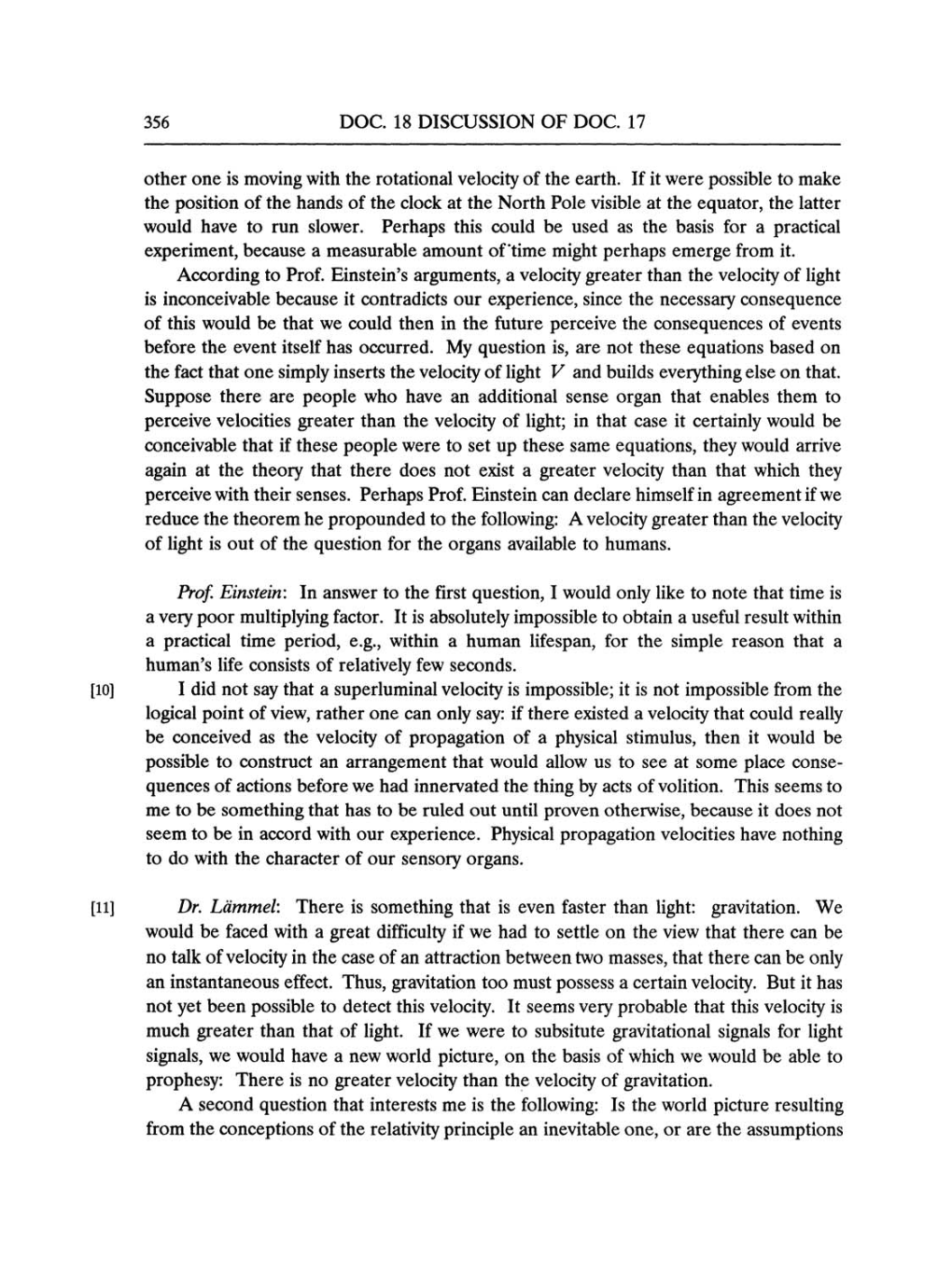356
DOC.
18
DISCUSSION OF
DOC.
17
other
one
is
moving
with
the rotational
velocity
of the earth. If
it
were possible
to make
the
position
of the hands of the
clock at
the North Pole
visible at
the
equator,
the latter
would have to
run
slower.
Perhaps
this
could be used
as
the
basis
for
a practical
experiment,
because
a
measurable
amount of time
might
perhaps emerge
from
it.
According
to Prof.
Einstein's
arguments,
a velocity
greater
than the
velocity
of
light
is
inconceivable
because
it
contradicts
our
experience,
since
the
necessary
consequence
of
this would be
that
we
could then
in
the
future
perceive
the
consequences
of
events
before the
event
itself
has
occurred.
My
question
is,
are
not
these
equations
based
on
the
fact
that
one
simply
inserts the
velocity
of
light
V
and
builds
everything
else
on
that.
Suppose
there
are
people
who have
an
additional
sense
organ
that enables them
to
perceive
velocities
greater
than the
velocity
of
light;
in
that
case
it
certainly
would be
conceivable
that
if
these
people
were
to set
up
these
same
equations, they
would arrive
again
at
the
theory
that there
does not exist
a
greater
velocity
than that
which
they
perceive
with
their
senses.
Perhaps
Prof.
Einstein
can
declare himself
in
agreement
if
we
reduce
the theorem
he
propounded
to
the
following:
A
velocity
greater
than the
velocity
of
light
is
out of the
question
for the
organs
available to humans.
Prof.
Einstein:
In
answer
to
the
first
question,
I would
only
like to note
that
time
is
a very
poor
multiplying
factor.
It
is
absolutely
impossible
to
obtain
a
useful
result
within
a
practical
time
period,
e.g.,
within
a
human
lifespan,
for
the
simple reason
that
a
human's
life consists
of
relatively
few seconds.
[10]
I did not
say
that
a
superluminal
velocity
is
impossible;
it
is
not
impossible
from
the
logical
point
of
view,
rather
one can
only
say:
if
there
existed
a
velocity
that could
really
be conceived
as
the
velocity
of
propagation
of
a
physical
stimulus,
then
it would
be
possible
to construct
an arrangement
that
would allow
us
to
see
at
some
place
conse-
quences
of
actions
before
we
had innervated the
thing
by
acts
of
volition. This
seems
to
me
to
be
something
that
has to be
ruled
out
until
proven otherwise,
because
it
does
not
seem
to
be
in accord with
our experience.
Physical
propagation
velocities have
nothing
to do with
the character of
our sensory organs.
[11]
Dr. Lämmel:
There
is
something
that
is
even
faster than
light: gravitation.
We
would
be
faced with
a
great
difficulty
if
we
had
to
settle
on
the
view
that there
can
be
no
talk of
velocity
in
the
case
of
an
attraction between
two
masses,
that there
can
be
only
an
instantaneous
effect.
Thus, gravitation
too must
possess
a
certain
velocity.
But
it has
not
yet
been
possible
to
detect
this
velocity.
It
seems very
probable
that
this
velocity
is
much
greater
than that of
light.
If
we were
to
subsitute
gravitational signals
for
light
signals, we
would have
a new
world
picture,
on
the
basis
of
which
we
would
be
able to
prophesy:
There
is
no
greater
velocity
than the
velocity
of
gravitation.
A
second
question
that interests
me
is
the
following:
Is
the
world
picture resulting
from
the
conceptions
of
the
relativity
principle an
inevitable
one, or are
the
assumptions
